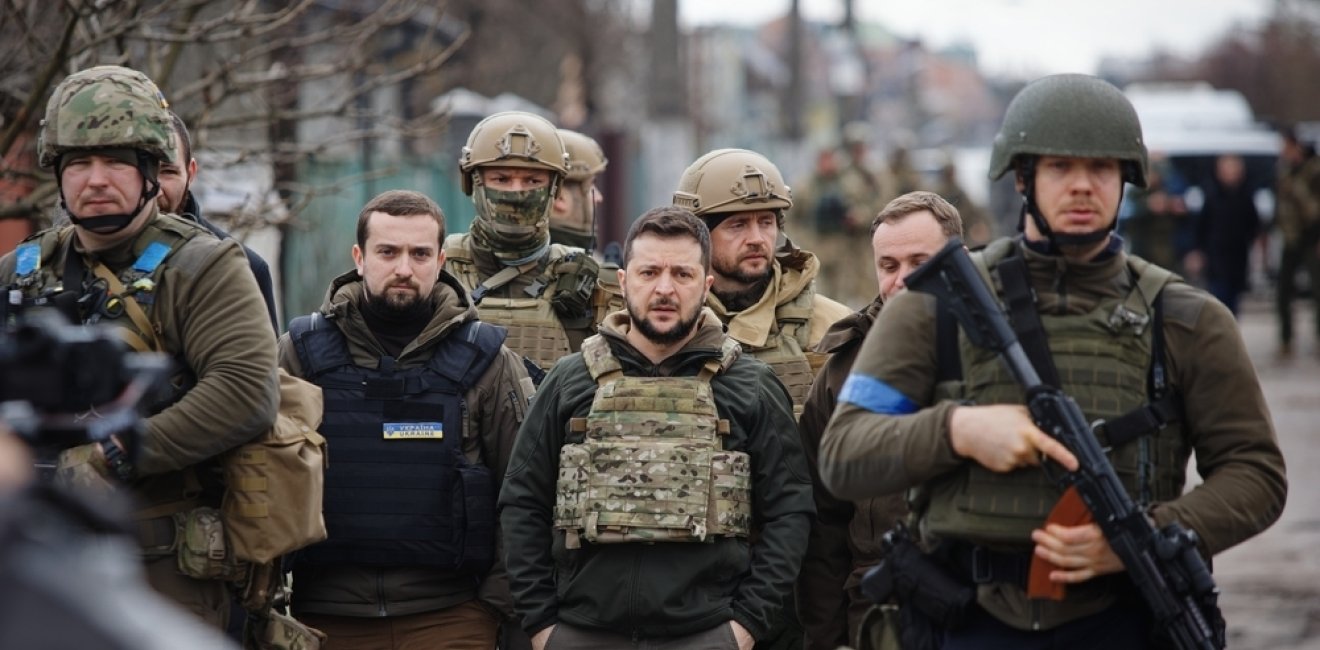
A blog of the Kennan Institute
The fifth year of Volodymyr Zelensky’s presidency concluded on May 20, 2024, but his service in office will continue until a new president is elected in Ukraine. The next presidential elections can legally be conducted only when Russia’s war against Ukraine is over and martial law is lifted. However, the fifth anniversary of President Zelensky’s governance presents an opportunity to assess his achievements so far. Several historians and political scholars who have long studied Ukraine were asked, what is the greatest success of the Zelensky presidency so far, and what is its biggest failure? Here are their answers.
Gwendolyn Sasse
Volodomyr Zelensky’s landslide victory in the presidential elections of 2019 is closely linked to his greatest success: he understood society’s mood across Ukraine at the time. When the incumbent Petro Poroshenko ran his campaign under the slogan “Army, Language, Faith,” trying to appeal to a narrower ethnolinguistic definition of what it means to be Ukrainian, Zelensky challenged him by portraying a more open, civic notion of Ukrainian identity. He is originally from Kryvyi Rih region in the Southeast of the country, and his first language is Russian, which he spoke throughout the election campaign. His message, including to Crimea and the occupied territories in the Donbas, was an inclusive one.
Zelensky may have lacked firsthand political experience, but he had an intuitive understanding of the bond of citizenship in a diverse country. On taking office, he switched to Ukrainian in official speeches, as required, but he remained authentic. This and his ability to communicate were also his biggest assets when Russia’s full-scale invasion started.
Among his election promises were an end to war and corruption. These were unrealistic objectives for one term in office. Russia clearly did not want peace, and Zelensky could have been more decisive in making the newly set up anticorruption institutions work more effectively.
His biggest mistake is that he has relied on trusted individuals rather than on institutions. As a result, parliament remains institutionally weak and, along with the government, continues to suffer from very low trust levels.
Michael Kimmage
Ukrainian president Volodymyr Zelensky’s greatest success is nothing short of his country’s survival under exceptionally adverse circumstances. This success has mirrored three separate lines of effort: his personal courage and will to fight, which reflects the courage and will of the Ukrainian people; his balancing of political forces within Ukraine, which has given unity and coherence to the war effort; and his enormous skill at communicating Ukraine’s cause to the wider world. Every war imposes its confusions and its ambiguities. President Zelensky has been masterful at providing clarity: the clarity of a single person in charge, the clarity of the war effort itself, and clarity of message. President Zelensky—and by extension the country he governs—will not give up. The true nature of such leadership is mysterious. It is not any single word President Zelensky has said or any single speech he has given; it is not contained in any one photograph or video. It is more the personal example he has set. He is able to envision a better future and to move Ukraine step by step toward its postwar destiny.
President Zelensky’s biggest failure is on the level of strategy. His task is crushingly difficult. He must marshal the resources (from Ukraine and the countries supporting Ukraine) necessary to achieve his strategic goals. The goals he has articulated have never been vague. They are the restoration of Ukraine's complete sovereignty and territorial integrity, and these goals are entirely admirable; they ring true. Yet in Russia, Ukraine faces an adversary that is a nuclear power, that has serious economic capabilities, and that has placed itself on a war footing, mobilizing its economy (more than its population) for the prosecution of a long war. President Zelensky does not yet have the resources he needs to defeat Russia in Ukraine. He must either acquire these resources, even as Ukraine’s outside backers are scaling back some of their commitments to the war effort, or he must change his strategy. Since the stalled Ukrainian counteroffensive of 2023, a gap has widened between President Zelensky’s self-confident statements and the grinding reality of a long war. None of this indicates that Ukraine has a losing strategy or that Ukraine will lose the war. It is merely proof that the country’s strategy for this unprovoked and terrible war is (as is to be expected) a work in progress.
Lesia Bidochko
Ironically, President Volodymyr Zelensky, who entered politics as a “president of peace,” has established himself as a formidable leader and a globally recognized wartime president. Prior to 2022, Zelensky was frequently criticized by political opponents for his perceived dilettantism, political immaturity, and lack of authority in the West. However, the onset of the full-scale invasion demonstrated his prowess as a president, politician, and commander-in-chief.
His most notable achievement was preserving the state and the stability of its vital processes in February–March 2022, during the first shock of the invasion, coupled with his ability to mobilize international support and influence foreign audiences.
Despite these strengths, the war has also illuminated Zelensky’s significant shortcomings, such as the absence of a strategic vision for Ukraine’s path to victory. This is reflected in the insufficient preparation for hostilities, overly optimistic expectations for a swift counteroffensive a year ago, and poor communication regarding the current need for mobilization.
Zelensky’s shortcomings can be attributed to the unprecedented circumstances he and all Ukrainians have faced. A war in the heart of Europe in the twenty-first century is an extraordinary situation, devoid of any preexisting manuals or guidelines. Consequently, responses to emerging challenges often have had to be symptomatic and improvised. While this approach has proven effective in certain instances, it underscores the necessity for a well-defined, concrete strategy to guide Zelensky and his team, rather than an abstract framework of actions.
Georgii Kasianov
Zelensky's greatest success is that he became president of Ukraine. In doing so he offered himself as a president of the future, embodying the great expectations of the electorate; a president imagined (by both the public and himself) as a person striving for change and for the country's good.
Zelensky's greatest failure is that he became president of Ukraine. He became a real president, even a president in the classical Ukrainian mold, a leader who embodies all the negative features of all previous Ukrainian presidents, who repeats all the failures, mistakes, and wrongdoings of his predecessors. Like them, he developed a personalized regime of power. Like them, he pursued the same method of selecting top state management, based on the principle of personal loyalty. His personal courage and devotion to the country under extreme challenges—during the COVID-19 epidemic, during Russia’s war—are exceptional. However, as a president, he, like his predecessors, lacks strategic vision and thinking. He remains a populist person from the TV sit-com in which he became president the first time.
Blair Ruble
President Zelensky’s greatest, even historic, achievement was to rally Ukrainians at the time of the Russian full-scale invasion in February and March 2022. His courage and ability to express outraged resistance saved Ukraine from certain defeat.
His biggest failure was investing in the failed “second front” throughout the summer of 2023. To be fair, this is a failure shared by many, but he was the person in charge.
Andrea Graziosi
President Zelensky’s greatest achievement is his courage and determination in answering the Russian aggression and deploying his capacity (1) to unite the country, nourishing Ukrainians’ trust in their state; (2) to win foreign support, at least in Europe and the United States in the following months; and (3) to lead the army and the country in the two great victories of 2022–2023, by humiliating the Russian army first and by destroying the Wagner groups in Bakhmut.
His greatest failure was the decision to launch the “counteroffensive” rhetoric and then to pursue it at a moment in which realism was required. In the summer of 2023 Ukraine had won its first war of independence; overconfidence was therefore understandable, and I am sure it enjoyed wide support. Yet foreign support could not be taken for granted; Russia was and still is three times as big as Ukraine; and above all, Putin controls the largest nuclear arsenal in the world, which makes his opponents very reluctant to defy him openly (which is why Ukraine never received all the armaments it needed). A wiser line of profiting from victory to take the lead in launching international negotiations would perhaps have been a better choice. I am aware that rational realism is not always a “good,” implementable policy, yet the counteroffensive rhetoric was wrong.
Andrew Wilson
For twenty years, the Ukrainian oligarchy has seemed an immovable feature. It survived the Orange Revolution and the Revolution of Dignity. Academics like me thought it important to devote attention to its survival strategies.
Now its decline is priced in. This is one of many reasons why Ukraine has continued, and in some places has increased, the pace of reform since February 2022. It has also meant the vast diminution of Russian networks of influence inside the country.
Zelensky deserves some credit. Less use has been made of the cumbersome 2021 Anti-Oligarch Law. The state has shown more discrimination: nationalizing companies linked to Russia-friendly oligarchs while putting less pressure on the likes of Poroshenko. There have been no patronal takeovers, with targeted companies gobbled up by other oligarchs or poligarchs, as happened with Yukos in Russia after 2003. Material losses have taken a toll on the oligarchs’ empires. Cycles of reproduction of oligarchical influence and wealth defense have been broken, particularly with their loss of media influence and the lack of elections to try to reclaim that influence. There are no big pots of money equivalent to the gas sector of procurement in the past to make the oligarchs rich again. Even the vastly expanded defense budget has seen only limited corruption scandals.
Andreas Umland
President Zelensky's biggest successes during his first five years in office have obviously been his public relations efforts during the first year of the war, both inside and outside the country. His off- and online appearances managed to consolidate both the Ukrainian national and Western international communities around Ukraine's defense. To be sure, a President Poroshenko or Tymoshenko may have also met this challenge if either of them had become president in 2019. Yet Zelensky probably has done better than they would have done in terms of public relations. In a way, this success of Zelensky is reminiscent of the unexpectedly exceptionally high electoral support that Zelensky received in the second round of the 2019 presidential elections—73 percent of the vote—by far the best result any Ukrainian presidential candidate has ever achieved.
His biggest failure was the insufficient prewar preparation of Ukraine, especially in Ukraine’s South. While other regions of Ukraine were relatively well-prepared for the Russian assault, the Ukrainian forces' performance in the South was disastrous during the first months of the war. Zelensky is not the only Ukrainian leader to blame for this manifest failure, but he does bear some responsibility for the high losses of territory there. In general, his leadership with regard to military issues, a field he is not familiar with, is weak, and he perhaps should have given more responsibilities to generals like Valerii Zaluzhny, both before and during the war.
The opinions expressed in this article are those solely of the author and do not reflect the views of the Kennan Institute.
Authors


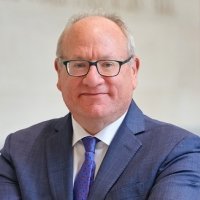

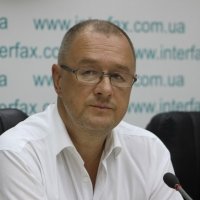

Former Wilson Center Vice President for Programs (2014-2017); Director of the Comparative Urban Studies Program/Urban Sustainability Laboratory (1992-2017); Director of the Kennan Institute for Advanced Russian Studies (1989-2012) and Director of the Program on Global Sustainability and Resilience (2012-2014)
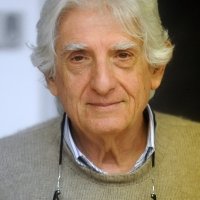
Professor of History, Università di Napoli Federico II

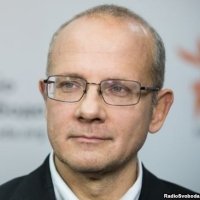
Analyst, the Stockholm Centre for Eastern European Studies at the Swedish Institute of International Affairs

Kennan Institute
The Kennan Institute is the premier US center for advanced research on Eurasia and the oldest and largest regional program at the Woodrow Wilson International Center for Scholars. The Kennan Institute is committed to improving American understanding of Russia, Ukraine, Central Asia, the South Caucasus, and the surrounding region through research and exchange. Read more

Explore More in Focus Ukraine
Browse Focus Ukraine
Talking to the Dead to Heal the Living

Ukrainian Issue in Polish Elections

